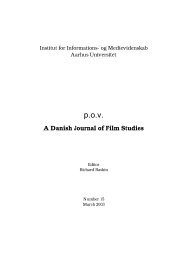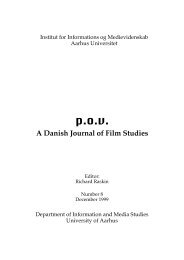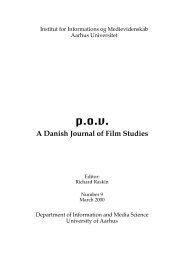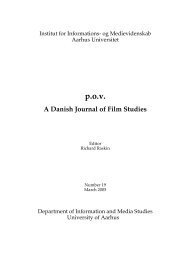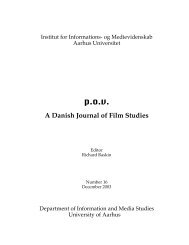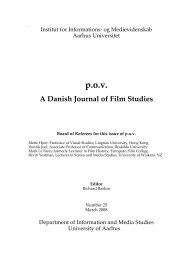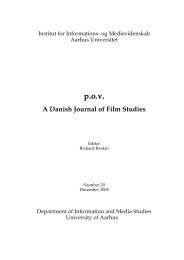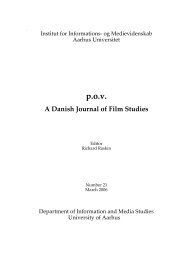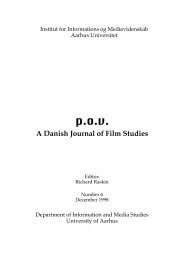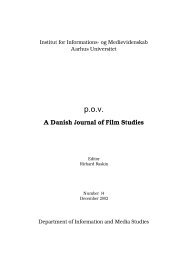The Face of Time - POV - Aarhus Universitet
The Face of Time - POV - Aarhus Universitet
The Face of Time - POV - Aarhus Universitet
You also want an ePaper? Increase the reach of your titles
YUMPU automatically turns print PDFs into web optimized ePapers that Google loves.
80 p.o.v. number 13 March 2002<br />
stacks <strong>of</strong> papers bulge from every shelf. First the shots from this<br />
archive come in very short sequences, like inserts in the ongoing<br />
images from the <strong>of</strong>fice. But gradually the archive files become the<br />
main character, so that human and social life become totally<br />
alienated and disembodied. Visually all human life disappears and<br />
is substituted by bureaucratic stacks <strong>of</strong> papers, and this visual<br />
metaphor is furthermore marked by sound manipulation.<br />
Just before we enter the archive a particular, absurd kind <strong>of</strong><br />
dialogue takes place in which the clerk states that in order to get a<br />
pension one must fill in a form where everything one has ever done<br />
in life, all <strong>of</strong> one’s jobs and places <strong>of</strong> work should be reported. <strong>The</strong>se<br />
sentences are repeated again and again until the archive seems to<br />
echo these words. It is as if life is buried in these archives, trying to<br />
get out, but in vain. Instead, just before the end a door is slammed<br />
very hard and everything sort <strong>of</strong> closes down.<br />
<strong>The</strong> documentary voices <strong>of</strong> Kieslowski<br />
Kieslowski’s film <strong>The</strong> Office is a clever documentary film with a<br />
sharp but subdued political message and critique <strong>of</strong> a communist<br />
bureaucracy. <strong>The</strong> film doesn’t speak criticism but shows it indirectly<br />
through the whole montage and visual style and framing. On the<br />
surface this is just a report on and observation <strong>of</strong> Polish everyday<br />
life in the 60s, but in reality it is a death sentence for and burial <strong>of</strong> a<br />
society in which systems and procedures are superior to humans.<br />
But even though it is a specific, social critique <strong>of</strong> Poland in 1966<br />
under communism, it is also a more general and existential portrait<br />
<strong>of</strong> bureaucracy at all times and in all kinds <strong>of</strong> societies.<br />
<strong>The</strong> same kind <strong>of</strong> almost tongue-in-cheek strategy is found in a<br />
much stronger form in some <strong>of</strong> Kieslowski’s documentaries from



